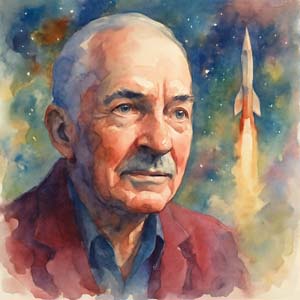— Robert A. Heinlein
 Born on this day in Missouri, Robert Anson Heinlein (1907–1988) sold his first short story, Life Line, in 1939 for $50. His debut novel, Rocket Ship Galileo (1947), launched a career that would change science fiction forever. His screenplay for Destination Moon (1950) was the first film to portray space travel realistically.
Born on this day in Missouri, Robert Anson Heinlein (1907–1988) sold his first short story, Life Line, in 1939 for $50. His debut novel, Rocket Ship Galileo (1947), launched a career that would change science fiction forever. His screenplay for Destination Moon (1950) was the first film to portray space travel realistically.
"My reputation rests almost solely on how I tell a story," he once explained. "My individual style. It is almost my entire stock in trade."
Heinlein wrote 54 books and won four Hugo Awards: Double Star (1956), Starship Troopers (1959), Stranger in a Strange Land (1961), and The Moon Is a Harsh Mistress (1966)—all chosen by popular vote. In 1975, he received the first Grand Master Nebula Award for lifetime achievement.
"Yield to temptation," he quipped. "It may not pass your way again."
In his landmark novel Stranger in a Strange Land, Heinlein coined the word grok—a Martian verb meaning to understand completely. The novel’s central figure, Valentine Michael Smith, was a human raised by Martians. The tale was profound, revolutionary—and one of your editor’s all-time favorites.
"I've found out why people laugh," said Valentine. "They laugh because it hurts... because it's the only thing that'll make it stop hurting."
Heinlein’s genius shaped generations. "We proceed down a path marked by his ideas," said Tom Clancy. Stephen King praised him as "a trademark for all that is finest in American imaginative fiction."
"Take big bites," Heinlein advised. "Anything worth doing is worth overdoing."
Robert A. Heinlein was honored among the Top 100 Writers of the 20th Century.Click to explore the rest.
 Your heart knows more than any expert.🚀
Your heart knows more than any expert.🚀
